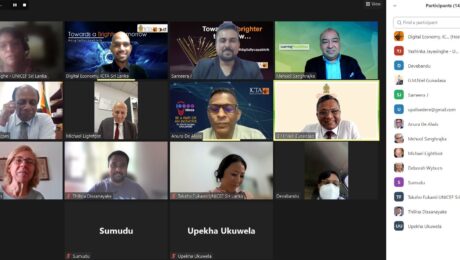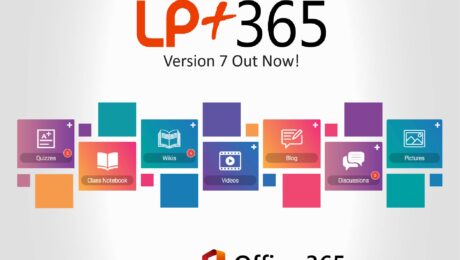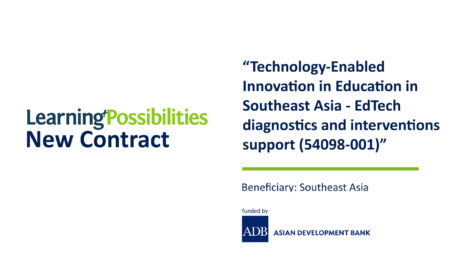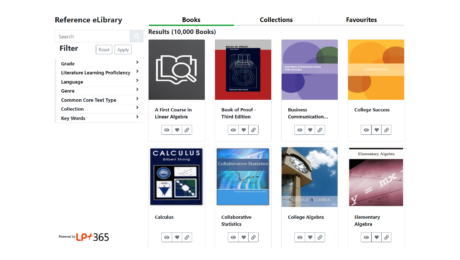New Project in Sri Lanka
We are delighted to have been selected to deliver this important project for the Sri Lanka Government (Information and Communication Technology Agency of Sri Lanka (ICTA), SMOER and Ministry of Education) in partnership with UNICEF. Throughout this pandemic we have seen that innovative and agile teachers have been able to support learners, whatever the technology. We are delighted to be working with the Government to help develop teacher capacity and digital skills in Sri Lanka, to support learners using a range of technology solutions.
Aminda James from the Information and Technology Agency for Sri Lanka commented:
To transform Education we need to transform Educators !!
The Digital Education team is excited to kick off the digital transformation of teachers in collaboration with UNICEF and the State Ministry of Education Reforms (SMOER) and the implementation partner LP+ from Learning Possibilities Limited
The initiative will ensure the creation of a comprehensive, detailed and well-sequenced online training module (ability to use offline as well) in both Sinhala and Tamil for teachers of government schools on distance/blended teaching with a mix of high tech and low-tech modalities relevant to Sri Lanka, inclusive of student assessment and pedagogy in digital learning. This will lead to a program where there will a master training program for 700 master trainers based on the above modules developed for teachers. The initiative will also focus on an online/offline parental awareness creation in both Sinhala and Tamil on the role of parents in supporting home-based/blended learning inclusive of online safety
This initiative is also in line with the Digital Education Policy that is being Jointly Developed by Information and Communication Technology Agency of Sri Lanka (ICTA) and SMOER and Ministry of Education.
- Published in Articles
LP 365 Version 7.0 First Look!
Learning Possibilities is delighted to announce v7.0 of it’s LP+365 platform. The platform was initially launched in 2005 and is now the leading cloud-based solution for transforming Office 365 into a learning and collaboration app for schools and colleges.
‘We are exciting that v7 will be launched in August’, said Mandeep Dhillon, CTO at Learning Possibilities who led the development team, ‘with significant new features’.
The new platform offers an exciting and modern new look and feel, with one-click access to key features on each dashboard. ‘We have significantly improved performance’, added Dhillon, ‘so that those with poor connectivity or devices have a better user experience’. The seamless integration with LP+ ADOPT, with single signon, means that courses, scorm content and exams can now be added to the platform.
The dashboard tiles also offer a download feature, enabling access to content when offline, and our e-library – with over 10,000 refence books – is built in.
For a first look, view our video:
For further details email info@lpplus.com
- Published in Articles
Project win Technology-Enabled Innovation in Education in Southeast Asia – EdTech diagnostics and interventions support, funded by the Asian Development Bank (ADB)
Learning Possibilities is delighted to be able to support the Ministries of Education in Cambodia, Indonesia, Philippines and Viet Nam with our technology and expertise to strengthen the education sector in each of these target countries.
Mehool Sanghrajka (CEO) commented, “Education has faced a very difficult year and we are excited to be supporting these four major economies in understanding what technology works in these countries, and what potential solutions can be deployed to drive education impact. My sincere thanks to the LP team that worked on this submission, and our partners at @ibf.”
The project will run from July 2021 until September 2023.
- Published in Articles
Reflections on the success of HWB+ Wales
Learning Possibilities in Wales – a world-class EdTech intervention promoting hybrid learning
As the school gates start reopening in the wake of the pandemic-induced closures, it is a good time to reflect on the lessons learned during the shift to online learning during these traumatic times.
When schools and governments begin reflecting, at a system level, on how to build resilience into the learning framework, two of the main takeaways from those schools that were best able to meet the learning needs of the whole school community during their forced closures are:
- Digital skills amongst the teaching workforce can no longer be confined to those who are skilful early adopters of the new technologies, but ALL teachers now need to have, at their fingertips, the skills and capacity to be able to operate hybrid learning online learning environments
- Students should be better prepared for a future that involves more home study and learning online through the development of their repertoire of skills and competencies in self-directed learning
The implementation of national learning platform in Wales, which Learning Possibilities installed and rolled out to more than 700,000 users, has been held out as a model of international best practice. In the study conducted by NESTA[1] in the UK, in collaboration with its international counterpart in Italy, the Welsh Government’s Strategy on Digital Competency in Wales, for which Learning Possibilities provided both the learning platform and the professional development and training framework, was singled out as one of only nine examples of best practice across the world.

The ‘Digital Competence Framework’ established digital competence as one of three cross-curricular responsibilities, alongside literacy and numeracy. The framework focuses on developing a broad set of digital skills required in our increasingly digital world. These span four main strands: citizenship, interacting and collaborating, producing; data and computational thinking.
Critical to the success of the project was the creation of learning platform, Hwb+, and the promotion of its use through the creation of ‘Digital Pioneer Schools’ which enabled the creation of a network for shared learning between schools and government, and also between Digital Pioneer Schools and other schools across Wales . The schools involved early in the programme acted as hubs for sharing learning, sometimes offering training for teachers from other schools facilitated via their Consortia. The school and teacher-led approach meant that through the Digital Pioneer Schools network, the government involved schools in the development process. This helped to gain buy-in from schools, while also stress-testing the framework in real settings. Another critical success factor was the creation of pairing and mentoring schemes. For example, one school supported the roll-out of Hwb+ in every classroom by ensuring that reluctant teachers were always paired with a more confident teacher. Additionally, student digital leadership schemes were set up in many schools, where students were given responsibility to support teachers and other peers with ICT issues and champion digital learning. Such schemes are reported to be effective in supporting teachers with IT frustrations, encouraging more teachers to use IT as well as developing leadership and communication skills in participating pupils.
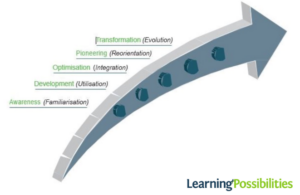
The ADOPT professional development framework from Learning Possibilities, was the implementation tool that was used in schools nationally as a roadmap to guide the journey from early familiarisation with the technology tools and resources available on Hwb+ learning platform and the steps towards transformation: where learning and teaching, in the new paradigm, fully embraces an integration of face-to-face and online learning in a truly hybrid manifestation.
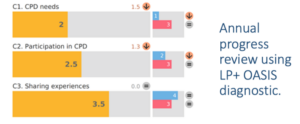
The resources to support the ADOPT framework are constantly being reviewed and improved by the technical team at Learning Possibilities and the framework has now been integrated with the LP-OASIS, online testing and evaluation system to produce annual progress reports charting the professional development of staff and informing the next stage of school development planning .
[1] National Endowment for Science Technology and the Arts
In Conversation with the World’s Best Teacher
- Published in Articles
Learning Possibilities adds 10,000 book library to its learning platform
The current pandemic has forced many to learn from home, without access to their school or public libraries.
We are delighted to provide the LP+ Reference eLibrary integrated into our platform. The eLibrary is a curated collection of more than 10,000 reference books that cover all stages of learning and include literary classics from around the world, foreign language and text books etc. The Reference library is only available through the LP+365 platform and can be made available on request.
The eLibrary has many features;
- All books are available to download and take anywhere.
- ‘Collections’ of recommended books.
- ‘Favourites’ allows you to mark books for later use.
- Perpetual links are easily available so books can be added to assignments or shared directly.
- Book discovery tools help teachers and students find the right material for them.
- Ministries are able to add their own books into the collection.
For further details, please contact us on LP365support@lpplus.com.
- Published in Articles
Education in the Pandemic – 12 months on
Its been just over a year since the world began shutting down. Around March 2020, Classroom learning was suspended, parents became teachers overnight and the screen (laptop, phone, tablet) became the mode of communication and delivery. Teachers became IT professionals, while “the cloud” (just like Apple & Amazon) had more than one meaning. Teams and Zoom effectively became bywords for communication tools.
As the pandemic developed, first came the panic as cities hollowed out (for the lucky few), followed by determination that we will defeat this, accompanied by the positive spin that our new lives were better, more calmer and family time was precious.
12 months on and reality is sinking in, if not sunk in. Parents can never replace teachers (the sigh of relief, jumps of joy, etc, in the UK on Monday as schools reopened was telling!), and zoom can never replace schools and classroom. However, many are also realising that technology does have an important role to play, and education is a collaborative approach between teacher, parents and the community. Many kids appreciate their teachers and parents more and are perhaps even more grateful for their friends. If having exams caused anxiety for children, the cancellation of exams in the UK seemed to have caused even more anxiety and panic for both parents and children.
All of this seems to suggest that while change is required, the approach needs to be considered, calculated and outcome driven. Companies of all shapes and sizes have rushed out solutions (some brand new, some modified), without as much as a second thought around outcomes and the long term implications. EdTech has become the new arena for commercialisation, but with a significant part of the world still trying to work out what Ed(ucation) it needs, incorporating Tech(nology) into the equation is not the do all, solve all solutions.
Digital skills are important, but it is even more important to develop broader skillset – interpersonal skills, non-digital communication skills, teamwork among others – and create an environment outside the screen. Culture, Dance, Music, Sport is just as, if not more important for our mental and physical wellbeing.
The mental effects are only just beginning to show, with phenomena like “Zoomed out”, “Teams Fatigue” are now a regular occurrence. Children who are introverted, or from areas with poor connectivity, or simply resource poor (not everyone has the latest device), often struggle to engage and beginning to suffer from low morale and self-worth.
Therefore, schools are now even more important, and it is critical that resources need to be focused on the right areas to improve the schools and the education system as a whole for the future, making it more resilient, more adaptable and more accessible.
As the past 12 months how shown us, technology can help fill the gaps, but it can never replace our need for social human interaction and 12 months on, it is clear that the schools of the future will need to have an element of blended learning to make it inclusive, accessible and resilient to whatever the future may hold.
- Published in Articles
Education 2021: A Blueprint for School Recovery
Blueprint for School Recovery white paper.
- Published in Articles
Education 2021: Road Ahead
Blueprint for School Recovery white paper.
Recording of webinar, 02/12/20.
- Published in Articles

